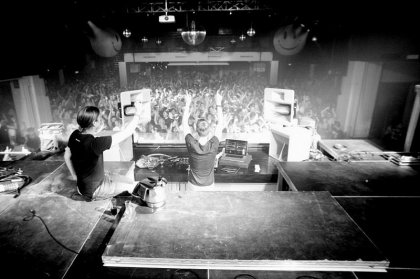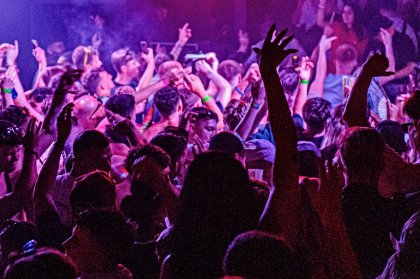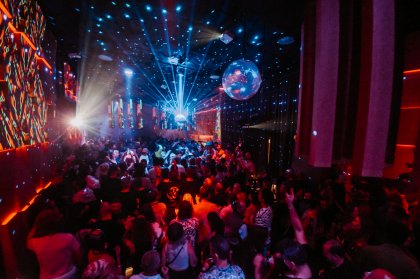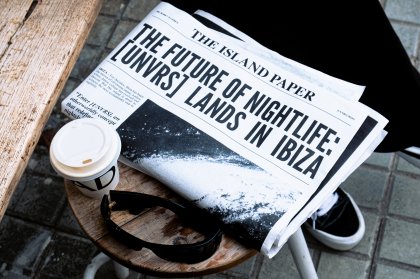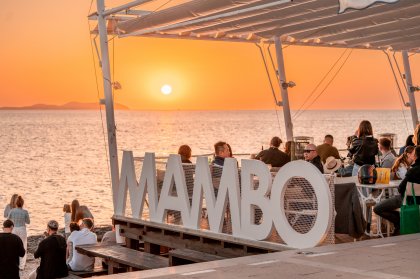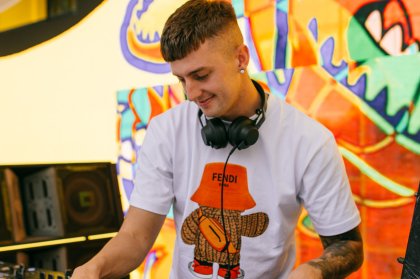
Greg Wilson is just a relatively normal man from the North-West of England who has lead a facinating life, championing the sounds of black music, and is without doubt partly responsible for their rise in popularity over the last several decades.
In talking to Greg, he comes across as an extremely articulate and knowledgable person... someone who's genuine mission is to make people aware of the history of many of the popular genre's of music you will hear on the Ibizian dancefloors today.
In an environment where the likes of Techo and House dominate, it's a pleasure to see some, such as Greg Wilson, commit to a different sound and use their passion to educate those around them.
I find your DJ blog fascinating, mostly because as you say, you intend it on
being a blog from a person who happens to be a DJ. You clearly come across to me as someone who genuinely loves what they do. Have you ever lost that passion?
I had a bumpy period in the 90's when I temporarily lost my muse. It was a
difficult time for me - money was tight and the recording project I'd put
all my heart and soul into had ground to a halt. As I've said elsewhere, I
remember being sat in my front room, on a number of occasions, pen in hand (as was my way back then) waiting for some kind of inspiration to come through - but I was blank. The TV was
turned down, or off, and there was nothing I wanted to listen to. All I could hear was the clock ticking, and I
was aware that that was my life passing by one second at a time. It was a
bleak time!
Of all the musical genre's in the world, why did you get into Disco, Jazz,
Soul and Funk area? And in which order did your love of them come?
I've been into black music since I was very young, going back to the 60's
when my older brother and sister were bringing loads of great Soul singles
into the house on labels like Tamla Motown, Stax and Atlantic. Funk was a
progression from there, as was Disco, which came directly out of Soul and
Funk before becoming increasingly Europeanized later in the 70's. The
Jazz-Funk scene was in some ways a reaction to the commercialisation of
Disco music, especially following the massive success of the movie 'Saturday
Night Fever' and the Bee Gee's led soundtrack. For me, Disco was always more about The O'Jay's than the Bee Gee's. Jazz-Funk was a specialist scene, with the DJ's playing mainly imports -
it was a big underground movement that took in a spectrum of black music, including the Soul, Funk and Disco Funk (or what is now retrospectively termed Boogie). I originally made my name
on a national level as a Jazz-Funk specialist, before gaining notoriety for championing the new electronic direction dance music began to take in the early 80's - Electro-Funk as we
originally called it.
Thanks for providing the mix, could you tell us a little bit about it? The
track selection, the event.
It's from Space in 2008. It was my first time there, and after playing in
the inside terrace I did a second slot at El Salon, where this was recorded.
It's a fairly downtempo vibe, which is an important part of the groove
spectrum I play, featuring some really big tunes for me, including a few
that turned up in my Essential Mix 5 months later.
Talk us through the equipment you use for your sets and why you use them.
It's a juxtaposition of the new and the old, on one hand I play from laptop,
but on the other I use an old Revox B77 reel-to-reel to pepper in some
sounds, samples and effects. This balance between then and now is always
important to how I approach things.
I think most people would agree you have been a pioneer for the the modern DJ, whether that is being the first DJ to mix on TV or doing the first re-edit of a track. How did these situations come up. considering they had never been done before?
I was fortunate to be in the right place at the right time. Playing
cutting-edge dance music at a time when everything was changing, and the old was giving way to the new. I adapted naturally to these changes and started to take mixing seriously at a time
when most other UK DJ's ignored it (the microphone still being all important). My radio mixes got me into editing, as these were recorded onto reel-to-reel, so it all kind of fell
together. I suppose it was down to me taking a progressive approach to deejaying when many others rested on their laurels, but fate certainly played its part - I was just able to
respond to it.
Why did you decide to stop being a DJ, and what changed to bring you back
into the fold?
With regards to why I stopped, my reasons are multi-layered, so I refer you
to the following piece I wrote: electrofunkroots.co.uk/misc/why_did_i_quit.html
I started up again after launching my website, Electrofunkroots - once I had
an online presence people began to offer me bookings, and it seemed like an
obvious step. Electrofunkroots was set up because I'd become aware that the
documentation of UK dance history had more or less omitted what I believe to be its very foundation - the black scene. This was where Funk, Disco,
Jazz-Funk, Jazz-Fusion, Electro, Street Soul, Boogie, Rare Groove, Hip Hop,
House and Techno were all first played in the UK. DJ's on the black scene
were responsible for breaking so many now classic records in this country,
yet it was as though they hadn't existed. There was this huge gaping hole
between Northern Soul and Acid House, so I saw it as my responsibility to
try to draw attention to this missing link in whatever way I could, and the
Electrofunkroots website allowed me to share my archive material,
particularly from the early 80's.
Lastly, will we be seeing you in Ibiza this year? We certainly hope so.
I like to get over at least once a year. The Space Terrace gig last year was
a real eye-opener - great response from a crowd who weren't used to the,
shall we say, less frantic approach I take. At first I think that one or two
weren't quite sure, the tempo being slightly out of their comfort zone, but
they soon got into the groove and it was a memorable night, which Mark
Broadbent of We Love cited as one of his favourite gigs of the summer.
